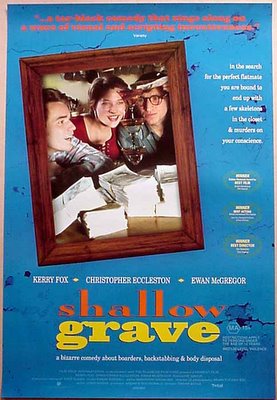
I received a letter from a friend--OK, an email, but from someone who doesn't see the form as an opportunity to dash off jibes and forward urban legends, but merely a letter delivery system that works faster than fast. He wrote at length on the state of modern irony in film, and the encroachment of "the New Sincerity." Again, I was pleased by the happy coincidences in my life--or at least that of my mind--because just last night I watched Shallow Grave, Danny Boyle's 1994 Hitchcock-meets-Seinfeld sneer-a-thon, in which a clever-clever, happy trio snips and capers, then snaps up every chance to indulge in merry greed, violence, and the cool thrill of the triple-cross, until they're left with a hysteria-laced goblet spilled across the tablecloth like Poe's mad wine, dark and venal. I saw it on video around 1996, and enjoyed its widdle-ol-wicked-me snicker and dull thud mayhem.
Maybe it's because of the movies I've been watching lately, or the fact that two of my children will all-too-soon be (hopefully clever) young adults on their own themselves, or simply the resolve I've been forming over the past near-decade--if I must say, since my parents died--to pass through with a bit less sniping and a bit more grace--not exactly Elvis C.'s move from disgusted to amused, but it'll do; but I didn't have as much fun with Shallow Grave as I did that near-decade ago. I couldn't stop thinking that this was not just a darkly witty, brilliant exercise--although it works as one--but a horror film for the wayward ironist; watching the three young up-and-comers (a physician, an investment banker, and a journalist) cut up a corpse, drive themselves to insanity--and drive knives deeply into each other--I was convinced that, despite their bright, helpless laughter at the film's start--which Boyle reprises briefly, in slo-mo, right before the credits roll at finis--their joy at being with one another, life was simply waiting to present them with an opportunity to be evil, and they chose it as easily as you scoop up a found dollar on the sidewalk. Circumstance is the only thing that kept them from madness and messy death.
Perhaps, then, the movie is no longer a Tarantino-esque no-brainer, not because I've turned into, as Jed Leland wonders about himself in Citizen Kane "a stuffed shirt, a horse-faced hypocrite, a New England school marm," but because I've caught up with Boyle's ironic fable of accident and opportunity. Social psychologist Philip Zimbardo, who conducted the famous "prison experiment" in the mid-1970s, writes about "dispositional" vs. "situational" evil, and concludes something moralists have always known: that we are all capable of evil, given the proper situation; it's just that the moralist also assumes a disposition to evil that makes even the slightest situational temptation a quivering bear-trap. Watching Shallow Grave with an ironic lack of irony--I think that's right--I stopped snickering--and passed right by being appalled--and moved on to sober sadness. Those poor bright young things. It took so little, but they took so much, including each other. Boy, am I lucky. So far.
No comments:
Post a Comment